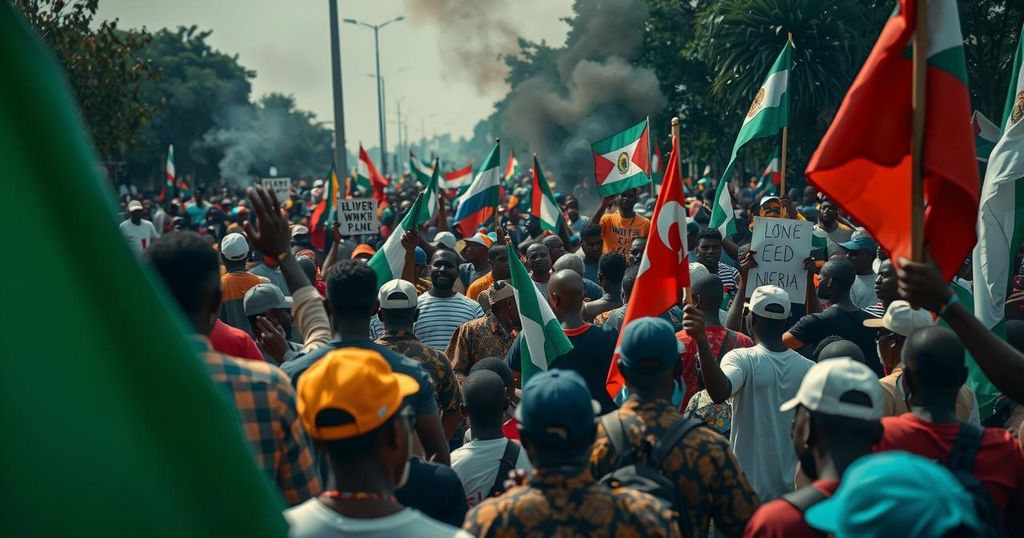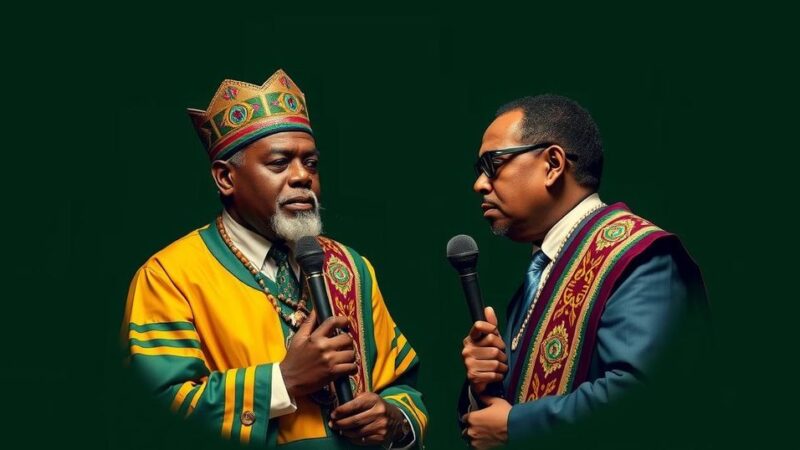Nigerians are protesting against government measures perceived as anti-poor, alongside rampant inflation and economic hardships. In demonstrations across various cities, participants have clashed with police, demanding substantial changes and expressing their frustrations over fiscal policies imposed under President Tinubu’s administration. These protests highlight the stark disparities between the government and ordinary citizens and signify a growing discontent regarding the state’s failure to address crippling living conditions.
In Nigeria, widespread protests against government policies perceived as harming the poor have erupted in various cities as citizens express their discontent over severe economic hardship. These demonstrations come amid the country grappling with unprecedented food inflation, causing significant suffering for the populace and forcing many to struggle with hunger. On Tuesday, protests surged particularly in Abuja, where police clashed with demonstrators using tear gas to disperse crowds chanting slogans demanding an end to hunger and poor governance. Activists from the Take it Back movement timed their protests to align with Nigeria’s 64th Independence Day, highlighting the drastic disparity between government officials’ lives and the common citizens’ struggles. Protest leader Juwon Sanyaolu criticized the government’s alignment with foreign fiscal recommendations from the World Bank, labeling them as anti-poor actions. “Why will they keep listening and dancing to the tune of these foreign interests while undermining Nigerians?” he asserted, noting the necessity for the government to prioritize the well-being of its citizens. Despite a heavy police presence, protesters in cities such as Lagos remained resolute, although some were deterred by intimidation tactics such as surveillance by armed forces. The public expressed fears rooted in previous violent crackdowns during earlier protests, including a series of arrests and fatalities. Economic conditions have severely deteriorated since President Bola Ahmed Tinubu’s administration implemented controversial World Bank measures, including removing long-standing fuel subsidies. These policies have contributed to increased food prices, crippling many families’ ability to afford basic necessities. Analysts have highlighted that ongoing inflation, stemming from multiple crises, including pandemic disruptions and armed violence affecting agricultural productivity, has led to lack of sufficient government responses to cushion the impact on ordinary citizens. Human rights organizations have raised alarms over the government’s heavy-handed response to dissent, paralleling previous administrations’ authoritarian traits. Activists fear that stifling civil liberties will persist—fueling an environment of oppression rather than addressing the systemic issues prompting protests. Although President Tinubu has announced measures aimed at economic relief, such as increasing minimum wage and initiating cash transfers, skepticism persists among the population regarding their sufficiency. Demonstrators remain steadfast in their demands, asserting their right to protest against policies that contribute to their suffering and calling for immediate government reform.
The recent protests in Nigeria represent a significant outcry against the government’s economic policies, which many citizens perceive to be detrimental to the poor. The context of these demonstrations is shaped by soaring food inflation, which has reached an all-time high, significantly impacting the daily lives and survival of the populace. The citizens’ dissatisfaction has been intensified by the government’s implementation of austerity measures and fiscal policies influenced by international financial institutions, which are seen as neglectful of local needs. Furthermore, the historical backdrop of police brutality during similar protests, such as the EndSARS movement, has cultivated a climate of fear among the public, juxtaposing their urgent need for reform against trepidation of government repression. This environment has compelled individuals and activist groups to mobilize collectively, demanding accountability from their leaders.
In summary, the protests emerging across Nigeria underscore the deep-seated frustrations of citizens amidst crippling economic conditions exacerbated by government policies perceived as favoring the elite over the poor. As the populace continues to voice their dissent, the government’s responses to these manifest displeasures will be crucial in determining the future political landscape and the ongoing struggle for civil liberties and economic justice within the nation. The resistance showcased during these protests reflects a growing demand for sustainable reforms and acknowledges the urgent need for genuine representation in governance.
Original Source: www.aljazeera.com






